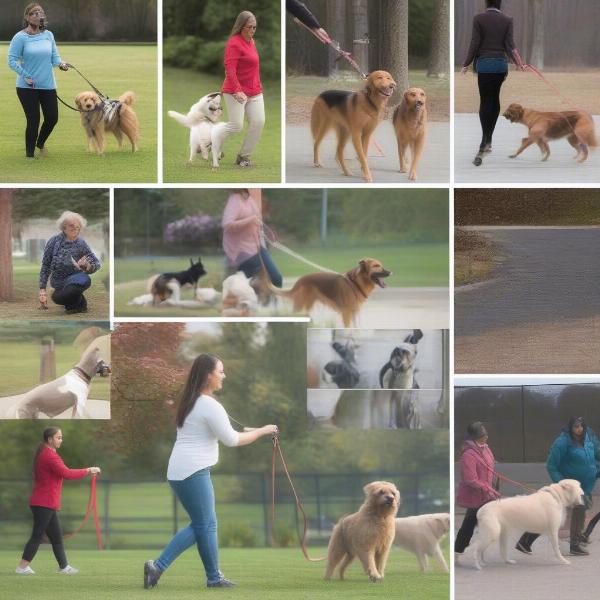Dog handling encompasses a wide range of skills, from basic obedience training for your family pet to professional handling in competitive shows or working dog scenarios. Whether you’re a new dog owner, a seasoned enthusiast, or aspiring to work with dogs professionally, understanding the principles of effective dog handling is crucial for building a strong, positive relationship with your canine companion. This guide will delve into various aspects of dog handling, providing valuable insights and practical tips to help you navigate this rewarding journey.
Understanding the Importance of a Dog Handling Course
A dog handling course provides structured learning and practical experience that significantly benefits both you and your dog. It equips you with the knowledge and techniques to communicate effectively with your dog, understand their behavior, and guide them towards desired actions. These courses cover a wide range of topics, from basic obedience commands to more specialized training for specific roles, like assistance dogs or search and rescue. Investing in a dog handling course fosters a stronger bond, improves communication, and enhances your dog’s overall well-being.
Choosing the Right Dog Handling Course
The ideal dog handling course caters to your specific needs and goals. Consider your dog’s age, breed, and temperament when selecting a course. Some courses focus on puppy training, while others cater to adult dogs with behavioral issues. Research different training methods and philosophies, like positive reinforcement or balanced training, to find an approach that aligns with your values. Look for certified instructors with experience and positive testimonials.
Key Skills Taught in a Dog Handling Course
Dog handling courses typically cover a range of essential skills, including:
- Basic Obedience: Sit, stay, come, down, heel, and leave it. These commands form the foundation of a well-behaved dog.
- Leash Training: Walking politely on a leash without pulling or lunging.
- Socialization: Exposing your dog to different people, dogs, and environments to build confidence and reduce reactivity.
- Behavior Modification: Addressing specific behavioral challenges, such as barking, jumping, or aggression.
- Advanced Training: Trick training, agility, or specialized training for specific roles (e.g., therapy dogs).
 Key skills taught in a dog handling course
Key skills taught in a dog handling course
Benefits of Professional Dog Handling
Beyond basic pet ownership, professional dog handling opens doors to various career paths. Becoming a certified dog trainer, behaviorist, or handler in competitive dog sports requires specialized knowledge and experience. A comprehensive dog handling course can provide a solid foundation for these pursuits. Furthermore, professional dog handlers play crucial roles in service animal training, law enforcement, search and rescue, and animal-assisted therapy.
What to Expect After Completing a Dog Handling Course
Completing a dog handling course empowers you with the skills and confidence to manage your dog effectively in various situations. You’ll gain a deeper understanding of canine behavior and communication, leading to a stronger bond and a more harmonious relationship. Your dog will benefit from improved obedience, reduced behavioral problems, and enhanced socialization skills, ultimately leading to a happier, healthier life.
FAQ
-
How long does a typical dog handling course last? Course durations vary depending on the content and level of training. Some basic obedience courses may span a few weeks, while more advanced programs can last several months.
-
Are dog handling courses suitable for all breeds? Yes, dog handling courses are adaptable to all breeds, though specific training techniques may be tailored to individual dog’s needs and temperaments.
-
Can I attend a dog handling course with my puppy? Many courses offer puppy-specific classes designed for early socialization and basic training.
-
What is the cost of a dog handling course? Course fees vary based on the location, instructor, and duration of the program.
Related Articles
About ILM Dog
ILM Dog (https://ilmdog.com) is your trusted international resource for all things dog-related. We provide comprehensive guidance on dog breeds, health, training, nutrition, grooming, and much more. Our expert advice caters to dog owners of all levels, from first-time puppy parents to experienced handlers. Whether you’re looking for breed-specific information or advice on dog training techniques, ILM Dog has you covered. Contact us via email at [email protected] or phone at +44 20-3965-8624 for personalized guidance.